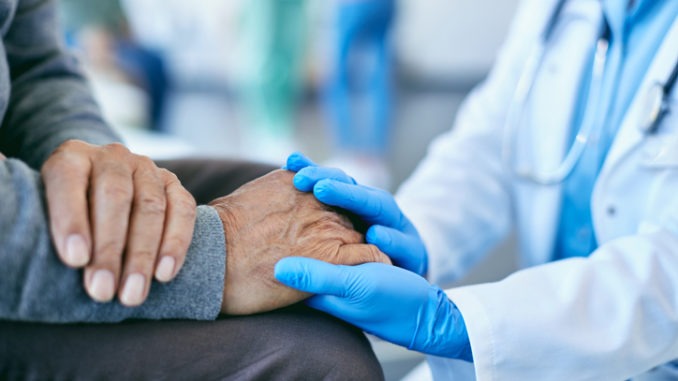
Plans to ‘ramp up’ in-person consultations are no solution to the deeper problems in our practices, argues GP Ellen Welch
CREDIT: This is an edited version of an article that originally appeared on The Guardian
My day today started at six am., faced with a roster of e-consults, alongside breastfeeding breaks and nappy changes, occasionally interrupted by a vocal toddler running in when he tires of daddy daycare. I am a part-time GP and mother to a two-year-old and a six-month-old. It’s not how I envisioned my medical career – but it works for me, for now. In our brave new world of telemedicine and remote consulting, I was able to return to work for the NHS when my baby was only a month old, while arranging face-to-face appointments with colleagues judged on what I feel my patient needs.
Sajid Javid’s plans to ‘ramp up’ in-person consultations are no more than a political soundbite – his offer of £250m a soggy sticking plaster which cannot buy non-existing GPs or extra consulting rooms. So, am I the problem? If you want to play the government’s blame game then I’m an easy target – part-time, a remote worker. Javid announced plans to list surgeries on league tables, exposing those failing to offer appropriate ‘access’ to patients – essentially naming and shaming practices. However, viewed another way, I could be part of the solution. Flexible working needs to be welcomed within the NHS in an attempt to hold on to an ever-dwindling, increasingly burnt-out, workforce. I can be a mum, provide for my family and continue to contribute to the NHS.
‘Call-centre doctor’ is no-one’s dream job, but this new way of working must be incorporated. Our practice gets emails every day from patients expecting e-consults. We’ll never be able to go fully back to the old system but that doesn’t seem to have got through to the government yet. I believe politicians should leave to healthcare professionals the decision on returning to face-to-face consultations.
The health secretary has provided no evidence, or modelling, on the current supply and demand in primary care to warrant a return to ‘blanket face-to-face’. Nor has he given the public realistic expectations on how long they might wait to see a GP face-to-face, as opposed to undergoing a telephone triage – it might be a month’s wait, instead of two hours.
A 48-hour response
Much of what I deal with remotely doesn’t need to be seen in person – fitness notes, contraceptive pill checks, follow-up of blood tests and discussions about mental health problems. With e-consults, patients can submit their queries via email and have a response within 48 hours, without the risk of picking up COVID from a crowded waiting room. If they now request a face-to-face appointment as ‘their right’, that’s fine, but they will be waiting a lot longer for a response.
Things haven’t all been great with work-from-home – the notion of set working hours has gone out of the window, for one – but GPs and their teams need to be trusted to deliver care in the most appropriate way for their local populations. Face-to-face care in general practice never stopped when needed; remote consulting was mandated during the pandemic to protect patients and, according to NHS England’s patient survey in July, they are happy with the care they received. The benefits of telemedicine have been embraced for years by private companies, such as Babylon and GP at Hand, and the NHS is only just catching up, ensuring the limited resources provided by the government get to the people who need them most.
We have a crisis in general practice which goes way beyond money. Despite government promises in 2019 to deliver 6,000 more doctors, GP numbers have fallen – through burnout, early retirement and emigration. Most GPs are working 12 hours or more a day, and ‘part-time’ GPs clock up the same number of hours as most nine-to-five workers. Abuse has become endemic; last month four practice staff in Manchester were hospitalised – one with a skull fracture from a disgruntled patient. I’ve been screamed and shouted at down the ‘phone on more occasions than I can count. Much of this abuse has been legitimised by some sections of the media with their clickbait, anti-GP campaign.
Not blameless
Politicians have not been blameless, with Boris Johnson, Sajid Javid and Jacob Rees-Mogg all making it clear in recent weeks that they expect GPs to go back to pre-COVID working conditions – but we’re still battling a pandemic; with winter approaching, I fear for our vulnerable patients. Is it right to encourage them to sit in doctors’ waiting rooms? Yet another example of our leaders being out of touch with general practice.
This needs to stop. Blaming GPs deflects attention from the damning Commons inquiry which exposes the failures of the UK government in the handling of the pandemic. The NHS was underfunded before this crisis hit, and the pandemic has only made the cracks in the system more visible. We need an independent investigation into the real problems around GP access, with GPs involved in the plan. It is worth remembering that GPs want nothing more than to provide good standards of care for patients.
If general practice fails, the NHS fails. There are solutions to this crisis, but the health secretary’s gestures are, sadly, adding to the problems rather than solving them.

Be the first to comment